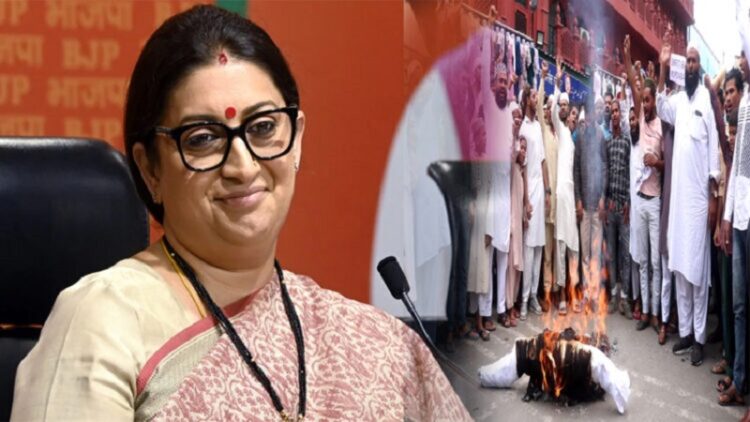New Delhi: On July 26, Minority Affairs Minister Smriti Irani made a significant statement, asserting that no Waqf Board in the country possesses the authority to expel anyone or any community from a religion. This statement comes amidst a heated dispute surrounding the Andhra Pradesh Waqf Board passing a resolution labelling the Ahmadiyya community as non-Muslims. Following her remarks, Islamist protests have erupted nationwide, with one such demonstration in Punjab’s Ludhiana witnessing the burning of an effigy of Irani near the Jama Masjid.
Prominent Muslim organisation Jamiat Ulema-e-Hind has come forward to support the Andhra Pradesh Waqf Board’s stance on the Ahmadiyya community, claiming it to be the unanimous position of all Muslims. It is noteworthy that in the controversial resolution, the Andhra Pradesh Waqf Board referred to the Ahmadiyya community as “kaffirs” and non-Muslims.
Responding to the situation, Irani asserted that no Waqf Board has the authority, as per the Act of Parliament, to expel any individual or community from a religion. She further revealed that the Minority Affairs Ministry had sought a reply from the Andhra Pradesh chief secretary and requested him to present the facts, considering that the Ahmadiyya Muslim community had appealed to the ministry.
Irani emphasised that all Waqf Boards come under the Act of Parliament and must not act contrary to the dignity of Parliament or violate laws enacted by it. She stressed that no Waqf Board is permitted to convert a fatwa into a government order. In response to the Andhra Pradesh Waqf Board’s resolution, the minority affairs ministry has penned a strongly worded letter to the state government, labelling the resolution as a “hate campaign” with potential repercussions across the nation.
On July 28, Muslims gathered outside the Jama Masjid in Ludhiana, expressing their protest by burning an effigy of Smriti Irani. Maulana Muhammad Usman Rahmani Ludhianvi, the National President of Majlis Ahrar Islam and Shahi Imam of Punjab, condemned Irani’s support for the Qadiani Jamaat, stating that it interferes with Islamic decisions and is unacceptable to Indian Muslims.
Maulana Muhammad Usman Rahmani Ludhianvi pointed out that Irani’s backing of the Qadiani Jamaat is surprising, and she should have considered historical facts before doing so. He asserted that just as opposing the BJP’s policies prevents one from becoming a party member. Similarly, anyone not adhering to the fundamental tenets of their religion cannot remain a part of it.
The Shahi Imam of Punjab reminded Irani of the history of the Qadiani Jamaat, founded during the British Empire in India, where its founder, Mirza Ghulam Ahmed, supported the British government while freedom fighters were sacrificing their lives for the nation’s independence. Ahmed’s claims of being a kind of prophet led to controversy, and his followers continue to face opposition to this day.













Comments